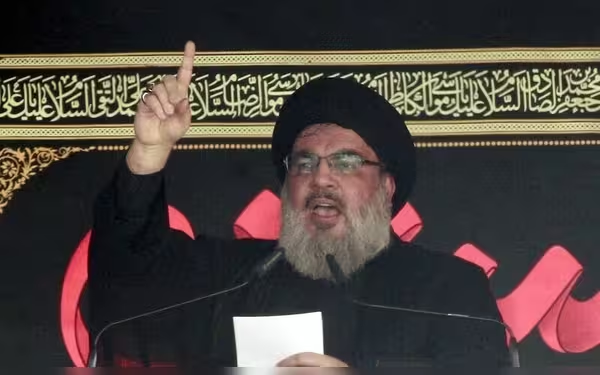Saturday, September 28, 2024 10:22 PM
Sayyed Hassan Nasrallah: Architect of Hezbollah's Regional Power
- Nasrallah's leadership solidified Hezbollah's regional influence.
- Hezbollah's victory in 2000 marked a turning point.
- Strategic alliances with Iran and Syria expanded Hezbollah's reach.
 Image Credits: dawn.com
Image Credits: dawn.comExplore how Sayyed Hassan Nasrallah transformed Hezbollah into a formidable regional force in the Middle East.
Lebanon has been a focal point of political and military tension in the Middle East for decades. At the heart of this turmoil is Hezbollah, a powerful militant group that has transformed into a significant regional force under the leadership of Sayyed Hassan Nasrallah. Since its inception, Hezbollah has played a crucial role in Lebanon's political landscape and has been involved in various conflicts, particularly with Israel. Understanding how Nasrallah has guided Hezbollah to its current status is essential for grasping the complexities of the region.
In a recent speech delivered on August 1, Nasrallah addressed the crowd at the funeral of Fuad Shukr, Hezbollah’s top military commander, who was killed in an Israeli airstrike. During this emotional address, he stated, "We are facing a great battle." This declaration underscores the ongoing challenges that Hezbollah faces, not only from external threats but also from internal political dynamics. Nasrallah's leadership has been marked by a blend of military strategy and political acumen, allowing Hezbollah to maintain its influence in Lebanon and beyond.
Hezbollah's rise to prominence can be traced back to the year 2000 when its guerrilla fighters successfully drove Israeli forces out of southern Lebanon, ending an 18-year occupation. This victory was a significant turning point for the group, as it bolstered its reputation among supporters and positioned it as a defender of Lebanese sovereignty. Nasrallah's ability to rally support and inspire loyalty among his followers has been instrumental in solidifying Hezbollah's status as a formidable force in the region.
Moreover, Nasrallah has adeptly navigated the complex web of alliances and rivalries in the Middle East. By aligning Hezbollah with Iran and Syria, he has secured vital support that has enabled the group to expand its military capabilities and political reach. This strategic partnership has not only enhanced Hezbollah's military strength but has also allowed it to play a pivotal role in regional conflicts, including the Syrian Civil War.
As Hezbollah continues to evolve, the implications of its actions extend far beyond Lebanon's borders. The group's military prowess and political influence pose challenges to Israel and other nations in the region. Nasrallah's leadership style, characterized by a mix of defiance and pragmatism, has ensured that Hezbollah remains a key player in Middle Eastern geopolitics.
Sayyed Hassan Nasrallah's role in transforming Hezbollah into a regional force cannot be overstated. His leadership has not only shaped the group's military strategies but has also influenced the broader political landscape of the Middle East. As the region continues to grapple with instability and conflict, understanding the dynamics of Hezbollah under Nasrallah's command is crucial for anyone seeking to comprehend the complexities of Middle Eastern politics.













